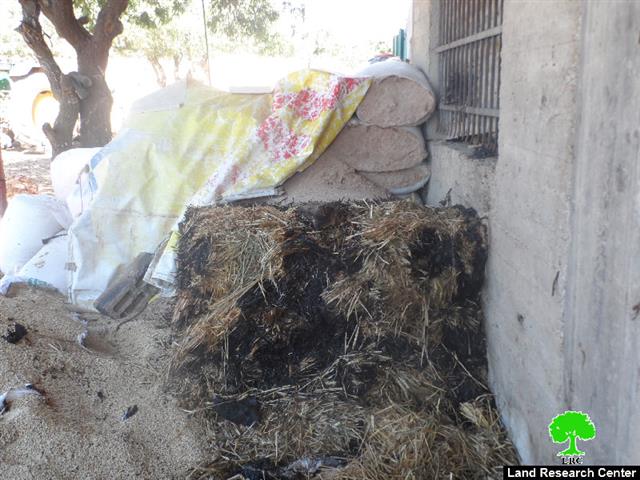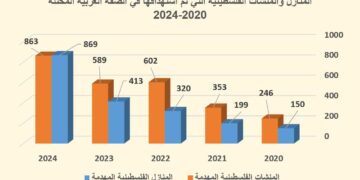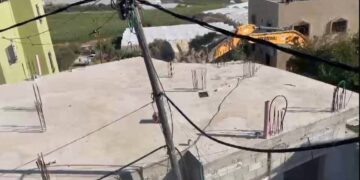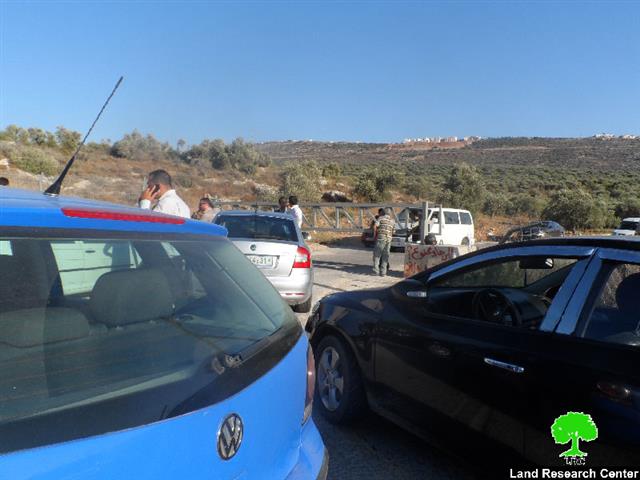Violation: Enticing hatred and torching a sheep farm
Location: Ras Karkas, Aqraba town, Nablus governorate
Date: 02/07/2014
Perpetrators: Price-tag group
Victims: A Palestinian family
Details:
Since the Israeli occupation authorities claimed finding the bodies of the three missing Israelis in Arnaba- Halhul, north of Hebron, the price-tag group has escalated its attacks at all levels, especially in the countryside in an attempt to force collective punishment on Palestinians, harass farmers and inflict as much damage as possible. Aqraba in Nablus came under attack as a result.
At 3:30a.m. on Wednesday, July 02, a group of Jewish extremists known as price-taggers sneaked into the southwest part of the town, particularly in an area known as "Ras Karkas" through taking bypass road no. 505 and walking a 1-km agricultural road.
Upon their arrival, colonists embarked on spraying anti-Arab slogans, the likes of "Death to Arabs", on the walls of a house. They also set fire to a sheep farm that belongs to the family of Fadi Bani Jaber. Luckily, the people around the farm, awake at suhur ( time for a meal consumed before fasting in Ramadan), rushed to the site, extinguished the fire and made colonists run away.
Picture 1: Price-tag graffiti sprayed at the wall
Pictures 2-4: The burnt farm
About the details of the attack, Fadi Bani Jaber stated to an LRC researcher that: "I was not there, but my family was and they told me what had happened. At dawn, my family felt there were strangers in the area. A bit later, they saw smoke coming out of the first storey of our residence, where the farm is. People rushed to my house where they found four colonists ready to leave. They ran away toward bypass road no. 505, which is 1 kilometer away from the house. On the spot, the family along with neighbors extinguished fire, took sheep out, and took control of the whole thing. Yet, damage occurred; 800 kilograms of straw and 8 agricultural shacks were destroyed."
Bani Jaber asserted to the researcher that: An hour before the aggression, the Israeli occupation army was spotted wandering in the area and breaking into houses. That further helps prove the interchangeable role of the Israeli police and colonists."
Bani Jaber is the only breadwinner and caretaker for his 6-member family. His profession is mainly about agriculture and sheep husbandry. He considers himself lucky that his 180 m2 farm was not totally destroyed.
Legal follow-up:
Mr. Bani Jaber is determined to file a complaint at the Israeli occupation police station about the attack.
Only an episode of attack series:
Aqraba has witnessed different kinds of attacks committed by colonist who have set fire to vehicles, confiscated lands, and uprooted trees. The attacks now follow an organized and routine pattern to serve the occupation and inflict damage on Palestinian farmers.
About Aqraba:
18 kilometers to the southwest of Nablus, Aqraba can be set as an example of a recurrent target for the Israeli occupation attacks.
The village total area is 34,660 dunums, mostly, agricultural lands. However, the Israeli occupation announced more than 281,000 dunums of the village lands military zone where Palestinians are not allowed to exploit in any way while soaking the area with various colonies including Gitit. That left only 1,350 of Aqraba land to be built-up area of the village.
The colonies are expanding on daily basis; they are classified as “agricultural settlements”; in addition, the Israelis have placed numerous watch towers and military encampments in order to control the whole region.
In 1969, ‘Aqraba witnessed the milling of by-pass road “506” which connects all the Israeli colonies to the east of ‘Aqraba besides easing the movement of the Israeli Occupation Army vehicles in the area; however, the Palestinians are not allowed to even get near the road.
More than 500 Palestinians are residing in nomads gathering around ‘Aqraba; the residents of these gathering face day-to-day threats against their houses, tents, shacks; basically, their existence. Additionally, the Israeli colonists try to chase these people out of their fields in an attempt to take over the area.
‘Aqraba is inhabited by around 8,180 people with unemployment reaching up to 50% because of the hard conditions imposed by the Occupiers.
Prepared by
The Land Research Center
LRC
















